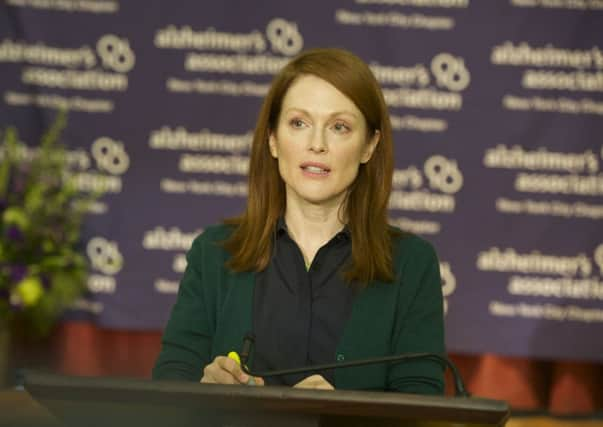Star’s passion for raising Alzheimer’s awareness


IT’S 12 years since Julianne Moore was nominated in two categories at the Academy Awards. She didn’t win. The Oscars went to Nicole Kidman and Catherine Zeta-Jones. Flash forward a dozen years and, at 54, she’s joined that 73-strong club: the women who have won the award as Best Actress. It’s been a long hard road but the evidence has always been there for everyone to see. She’s a class act, and a classy actor.
Yet Still Alice was the little, no-budget indie that might easily have been overlooked or, worse, underlooked. If too few people had seen it then Moore and her astonishingly affecting performance as the academic slowly losing her faculties to Alzheimer’s would have been just another non-starter.
Advertisement
Hide AdAdvertisement
Hide AdInstead she stormed the Oscars as all the insiders said she would. And rightly so. In a landscape overloaded with franchise flicks and vapid superhero blockbusters that demand attention but little else, Still Alice is real, raw and remarkable.
The film might never have been made. Shortly before it went into production co-director and co-writer Richard Glatzer was diagnosed as having amyotrophic lateral sclerosis (ALS), or Lou Gehrig’s disease. Yet with Yorkshire-born partner, co-director and co-writer Paul “Wash” Westmoreland he was able to play a significant part in the making of the movie.
Says Moore: “It was clear that they were dealing with their own issues with this really crazy degenerative disease. Yet they were there every day and prepared every day. We were struck and moved and inspired by their work ethic and by the fact that they were a real demonstration of what do you pursue? That’s what this movie is about. What lives do we lead, what do we care about, what do we want to say, who do we want to be and who do we want to be with? And so for us as actors to be in the presence of this was truly inspiring and a great gift.”
Moore talks about “the great challenge” of portraying Alice and calls the film “an unusual project, the first movie I’ve seen that talks about a condition like this presented subjectively, completely from her point of view.”
Advertisement
Hide AdAdvertisement
Hide AdTackling the mechanics of what happens to Alzheimer’s sufferers meant doing a ton of research. She met and spoke with people at every stage of the disease. Her question was the same: what does it feel like? “[They would talk about] seeing a word hanging in front of them, knowing it’s there, but not being able to get there. And that idea of not really knowing who you are. If I define myself one way but my intellect is no longer the same thing, what am I? We think about ourselves by what’s on the inside and that’s why Alzheimer’s is so terrifying. We all tried to represent it as much as possible and I got as close as I could.”
During the course of filming Moore was given a magazine piece which indicated that women in their sixties have a one-in-six chance of developing the condition, the same as breast cancer.
“The other terrifying thing is that once you’re diagnosed there’s very little you can do to alter the progression of the disease. But personality remains in a remarkable way. I saw this with people who were pretty declined.
“But, listen: 30 or 40 years ago no one knew what to do about cancer.
“And with enough money and time and research there are so many things that they can do now. So people in the Alzheimer’s community feel they are a stone’s throw away from something meaningful.”